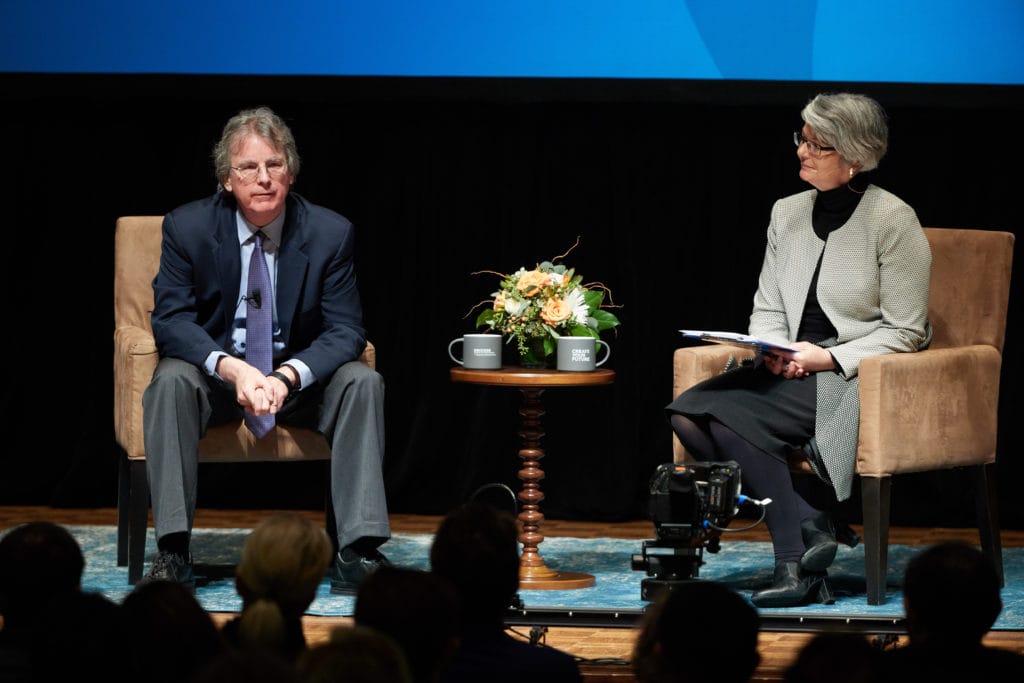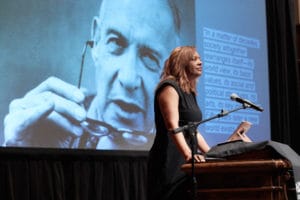This Year’s Drucker Day Takes on Facebook, Healthcare, and Hollywood

Do organizations fix society’s problems—or make them worse?
More than 400 registered guests, including alumni and prospective students, gathered for this year’s Drucker Day, which focused on this question and was themed “A Spotlight on Organizations – and Their Leaders – That Contribute to a Functioning Society.”
Held this year in the Little Bridges Hall of Music, the event was emceed by Associate Provost Andy Vosko and kicked off with a greeting from Drucker Dean Jenny Darroch followed by keynote speaker Bettina Sherick (MBA, ’98), senior vice president of consumer insights and innovation for 20th Century Fox.
Her keynote’s message was clear and straightforward: the most powerful people in the world are storytellers.
Sherick’s address paid tribute to the imaginative power of blockbuster films like “Star Wars” in 1977 and to their ability to uplift society and engage in serious discussions of race as illustrated by 2018’s “Black Panther.”

For Sherick, who is the founder of Hollywood in Pixels, Inc., movies like “Star Wars” and “Black Panther” can transform society because the storyteller, as Steve Jobs famously said, is the one who sets “the vision, values and agenda of an entire generation that is to come.”
She also reminded the audience that storytelling is an essential part of what makes us human. According to “Sapiens” author Yuval Noah Harari, she said, the key difference between humans and all other species rests in the human ability to “use imagination and language to create new worlds, alternatives and possibilities.”
In his session about the harmful impact of digital platforms like Facebook and Google, venture capitalist and investor Roger McNamee shared a personal account of how in 2016, as an early mentor to Mark Zuckerberg and an investor in Facebook, he became alarmed by the serious damage the company was doing to society – a dilemma discussed in McNamee’s new book, Zucked: Waking Up to the Facebook Catastrophe.
“When I shared my fears with Mark and Sheryl Sandberg (Facebook’s COO) that the company’s algorithms and business model were being used nefariously, they were dismissive,” he said. “They viewed it as a public relations problem, not a business problem.”

According to McNamee, the Facebook team saw Facebook as a “platform, not a media company,” and therefore they felt that it was protected from “anything anybody does.”
McNamee said he did a “180-degree reversal” from being one of Facebook’s biggest cheerleaders to an outspoken critic.
“It’s not a right vs. left issue,” he said of Facebook’s allowing thousands of Russia-backed advertisements on the site prior to the 2016 presidential election. “It’s right vs. wrong.”
In a panel about the current state of world healthcare and how it contributes to a functioning society, Beth Zachary (MA, Executive Management, ’92) said that in her 40 years as a healthcare management executive she has developed a strongly-held belief that what is most important in healthcare happens in the local community.
“It’s a very controversial belief today,” she explained, “as we see huge consolidations of hospitals and medical groups.”

“We took the community out of the name in our hospital, but not the community out of the hospital,” added Richard Yochum, President and CEO of Pomona Valley Hospital Medical Center. “I think some of us have lost our understanding of who our customer is.”
Walt Johnson (EMBA, ’10; MPH, ’12) head of the World Health Organization’s Emergency and Essential Surgical Care program, addressed the issue from a global perspective.
For him, the idea of a “customer base” usually refers to villagers in low-resource settings with hospitals that are often a 100-kilometer walk away. He agreed that knowing your customers and following up with meaningful actions at the local level are crucial steps in the care process.
“You can put the best hospitals in the middle of nowhere but unless you’re integrated with the community, no one will go to them,” he said.
In addition to the slate of speakers, a Lifetime Achievement Award was presented to Jean Lipman-Blumen, Thornton F. Bradshaw Professor of Public Policy and Professor of Organizational Behavior Emeritus at the Drucker School.

Lipman-Blumen served as a special advisor in the White House during the Carter administration and published seven books, including one nominated for the Pulitzer Prize.
In her keynote remarks, Sherick said she found her voice and confidence as a student at the Drucker School.
“I credit everything that happened to me after attending this institution to my Drucker MBA,” she said.
It was sentiment underscored by many attending this year’s event.
Visit here to learn more about Drucker Day at the Drucker School of Management.